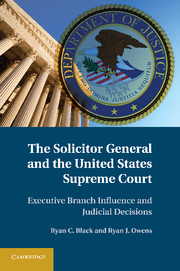 The Solicitor General and the United States Supreme Court
The Solicitor General and the United States Supreme Court Book contents
- Frontmatter
- Contents
- Acknowledgments
- 1 The Solicitor General and the Supreme Court
- 2 The Office of the Solicitor General: “The Finest Law Firm in the Nation”
- 3 Explanations for Solicitor General Success
- 4 Solicitor General Influence and Agenda Setting
- 5 Solicitor General Influence and Merits Outcomes
- 6 Solicitor General Influence and Briefs
- 7 Solicitor General Influence and Legal Doctrine
- 8 Conclusion
- Appendices
- References
- Index
2 - The Office of the Solicitor General: “The Finest Law Firm in the Nation”
Published online by Cambridge University Press: 05 May 2012
- Frontmatter
- Contents
- Acknowledgments
- 1 The Solicitor General and the Supreme Court
- 2 The Office of the Solicitor General: “The Finest Law Firm in the Nation”
- 3 Explanations for Solicitor General Success
- 4 Solicitor General Influence and Agenda Setting
- 5 Solicitor General Influence and Merits Outcomes
- 6 Solicitor General Influence and Briefs
- 7 Solicitor General Influence and Legal Doctrine
- 8 Conclusion
- Appendices
- References
- Index
Summary
During his testimony before the Senate Judiciary Committee to become solicitor general (SG), Paul Clement discussed the virtues and complexities of working in the Office of the Solicitor General (OSG), or what he called “the finest law firm in the Nation” (Clement 2005, 5). The SG, stated Clement, has important responsibilities to each of the three branches of the federal government. An actor with legal and political responsibilities, the SG must advocate for the government but must also be cognizant of the Court's needs and demands:
The Solicitor General is an executive branch official, and the office defends the policies and practice of the executive branch in the courts when they are challenged. … The office quite literally sits at the crossroads of the separation of powers as the primary vehicle through which the Article II branch of Government speaks to Article III. But, of course, the office also owes important responsibilities to the Article I branch, the Congress of the United States. … Finally, the office also owes an important responsibility to the Supreme Court of the United States. I have heard reference made to the Solicitor General as the tenth Justice of the Supreme Court. I am quick to add I have never heard that comment made by any of the nine real Justices.
Clement's testimony reflects an important concept. The SG must simultaneously weigh a number of factors when determining whether and how to proceed with cases.
- Type
- Chapter
- Information
- The Solicitor General and the United States Supreme CourtExecutive Branch Influence and Judicial Decisions, pp. 10 - 28Publisher: Cambridge University PressPrint publication year: 2012


